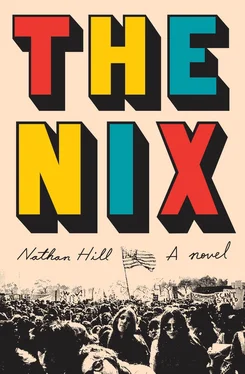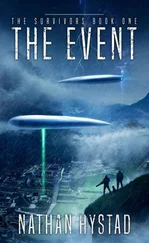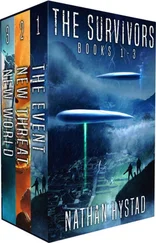Over his shoulder, Molly Miller sang to the dancing, cheering throngs. She was not supported onstage by a band or even a boom box and appeared to be singing a cappella. But her fans danced and jumped all out of proportion to someone singing a cappella, implying that actual music was coming from somewhere off camera in the non-diegetic fashion that has become de rigueur in pop music videos. Just go with it.
Pwnage said, “A game will always tell you how to win. Real life does not do this. I feel like I’ve lost at life and have no idea why.”
“Yeah.”
“I mean, I screwed up with the only girl I’ve ever loved.”
“Me too,” Samuel said. “Her name was Bethany.”
“Yeah. And I don’t have any career to speak of.”
“Me too. I actually think there’s a student who wants to get me fired.”
“And I’m upside down on my mortgage.”
“Me too.”
“And I spend most of my time playing video games.”
“Me too.”
“Dude,” Pwnage said, looking at Samuel with bulbous, bloodshot eyes. “You and I? We’re, like, twins.”
They watched Molly Miller’s video in silence for a time, Pwnage eating, the both of them listening to the song, which was circling back to its chorus for like the fourth time now and so must have been approaching its end. Molly’s lyrics hinted at something barely out of reach, something just beyond comprehension, mostly because of her use of the pronoun “it” with shifting, ambiguous antecedents:
Don’t hurt it. You gotta serve it.
You gotta stuff it, kiss it.
I want to get it.
Push up on it. ’Cuz I’m gonna work it.
You got it? Think about it.
Then, after each verse, Molly shouted and the whole crowd shouted the line that launched them into the chorus—“You have got to represent!”—while throwing their fists into the air as if they were protesting something, who knows what.
“My mother abandoned me when I was a kid,” Samuel said. “She did to me what Lisa did to you. One day, gone.”
Pwnage nodded. “I see.”
“Now I need something from her and I don’t know how to get it.”
“What do you need?”
“Her story. I’m writing a book about her, but she won’t tell me anything. All I have is a photograph and a few sketchy notes. I know nothing about her.”
Samuel had the photograph in his pocket — printed out on copy paper and folded up. He opened it and showed it to Pwnage.
“Hm,” Pwnage said. “You’re a writer?”
“Yeah. My publisher’s going to sue me if I don’t finish this book.”
“You have a publisher? Really? I’m a writer too.”
“No kidding.”
“Yeah, I have this idea for a novel. I started it in high school. A police detective with psychic abilities on the trail of a serial killer.”
“Sounds exciting.”
“I have it all mapped out in my head. At the end — spoiler alert — there’s an epic showdown when the trail finally leads to the detective’s own ex-wife’s daughter’s boyfriend. I’ll write it as soon as I find the time.”
The skin of his cuticles, and the skin around his eyes, and the skin around his lips, and really the skin at all the intersections of his body had a deep and aching redness. A scarlet pain wherever one thing turned into another. Samuel imagined it hurt him to move, or blink, or breathe. Pink splotches on his scalp where tufts of white hair had fallen out. One eye seemed to open wider than the other.
“My mother is the Packer Attacker,” Samuel said.
“The Packer what?”
“The woman who threw rocks at that politician.”
“I have no idea what you’re talking about.”
“Yeah, I missed it too at first. I think it happened the same day as our raid. The one against the dragon.”
“That was an epic win.”
“Yeah.”
“ Elfscape can actually teach us a lot about living,” Pwnage said. “Take this problem with your mother? Easy. You only need to ask yourself what kind of challenge she is.”
“What do you mean?”
“In Elfscape, as in every video game, there are four kinds of challenges. Every challenge is a variant of these four. It’s my philosophy.”
Pwnage’s hand hovered over the nacho rubble, searching for any chip that still retained its structural integrity, many of them having gone flaccid in the cheese-and-oil swamp that gathered on the bottom of the pan.
“Your philosophy came from video games?” Samuel said.
“I find this is also true in life. Any problem you face in a video game or in life is one of four things: an enemy, obstacle, puzzle, or trap. That’s it. Everyone you meet in life is one of those four things.”
“Okay.”
“So you all you have to do is figure out which kind of challenge you’re dealing with.”
“And how do you do that?”
“Depends. Say they’re an enemy? The only way to defeat an enemy is to kill them. If you killed your mother, would it solve your problem?”
“Definitely not.”
“So not an enemy then. That’s good! Maybe she’s an obstacle? Obstacles are things you have to find your way around. If you avoided your mother, would it solve your problem?”
“No. She has something I need.”
“Which is?”
“Her life story. I need to know what happened to her, in her past.”
“Okay. And there’s no other way to get this?”
“I don’t think so.”
“Aren’t there historical documents?” Pwnage said. “Do you not have family? Can you not do an interview? Do writers not do research?”
“Well, my grandfather, on my mother’s side. He’s still alive.”
“There you go.”
“I haven’t talked to him in years. He’s in a nursing home. In Iowa.”
“Mm-hm,” Pwnage said. He was using a spoon to lap up the remaining nacho sludge.
“I should go talk to my grandfather, is your advice,” Samuel said. “Go to Iowa and ask him about my mother.”
“Yes. Figure out her story. Piece it together. It’s the only way you’ll solve your problem, if indeed it’s an obstacle-type problem and not in fact a puzzle or a trap.”
“How can you tell the difference?”
“You can’t at first.” He discarded the spoon. The nachos were, for the most part, entirely consumed. He dabbed his finger into a spot of cheese, then licked it clean.
“You have to be careful,” Pwnage said, “with people who are puzzles and people who are traps. A puzzle can be solved but a trap cannot. Usually what happens is you think someone’s a puzzle until you realize they’re a trap. But by then it’s too late. That’s the trap.”
HERE’S A MEMORY: Samuel is riding in the backseat on a summer trip to his parents’ hometown in Iowa. Mom and Dad are up front, and he’s avoiding the side with the sun, and he’s staring out the window at the passing scenery, the terrifying traffic of Chicago and the brick-and-steel girth of the city giving way to the more predictable ebb of the prairie. The DeKalb Oasis is the last tendril of civilization before the surrounding farmland begins. Huge open sky that’s all the more huge because there’s nothing to interrupt it: no mountains, no hills, no topography at all, just flat green endlessness.
Then crossing the Mississippi River and Samuel trying to hold his breath for the whole span of that great concrete bridge, looking down and seeing the barges traveling south, and tugboats, pontoon boats, speedboats pulling inner tubes on which people — pink specks from this height — bounce. They exit the interstate and turn north and follow the river all the way home, to where his parents come from, where they grew up and became high-school sweethearts, is the story he’d been told. Up Highway 67, the river on his right, past the gas stations that advertise live bait, the American flags flying from VFWs and public parks and golf courses and churches and boats, the occasional John Deere tractor halfway on the shoulder, the occasional Harley riders who stick out their left hand to greet other Harley riders going the opposite direction, past the quarry where orange gravel gets kicked up by tires, past the speed limit signs rigidly enforced, and past other signs too, some torn back by buckshot — DEER NEXT TWO MILES, CAUTION PLANT ENTRANCE, THIS HIGHWAY ADOPTED BY THE KIWANIS CLUB. Then the red-and-white stacks of the nitrogen plant coming into view, followed by the massive white vats of Eastern Iowa Propane, the behemoth ChemStar facility that regularly makes the whole town smell like burned breakfast cereal, the grain elevator, the little townie businesses: Leon’s Body Shop, Bruce’s Beauty Hut and Firearm Repair, Sneaky Pete’s Rare Finds Antiques, Schwingle’s Pharmacy. Toolsheds in backyards built from aluminum siding. Second garages whose walls are all exposed Tyvek. Houses with three or four or maybe five operational and sometimes meticulously maintained and decked-out automobiles. Teens riding on mopeds, little orange flags whipping above their heads. Kids in bare fields riding four-wheelers and dirt bikes. Trucks towing boats. Everyone using their blinker.
Читать дальше












